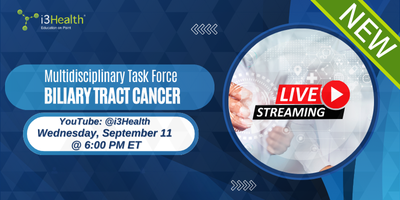- Overview
- Meet the Task Force
- YouTube Live Channel Information
- Overview
-
More
- Meet the Task Force
- YouTube Live Channel Information
STATEMENT OF NEED
Biliary tract cancer (BTC) encompasses a diverse group of invasive cancers that include gallbladder cancer and intrahepatic, perihilar, and distal cholangiocarcinomas, accounting for less than 1% of all cancers. Each subtype has distinct clinical and molecular features which complicate diagnosis and require personalized workup and assessment for complications (Vogel et al, 2023). Genomic research in recent years has begun to uncover the molecular underpinnings of BTC and introduce the development of targeted therapies for unique molecular alterations (Lee & Song, 2024). With a rapidly evolving diagnostic and therapeutic landscape, it is crucial that the interprofessional team remain up-to-date on emerging treatment strategies in order to provide optimal care for their patients. This Multidisciplinary Task Force will explore challenges and innovations in BTC. It features perspectives from Anjana Pillai, MD, Professor of Medicine and Surgery and Medical Director of the Liver Tumor Program at the University of Chicago Medicine Comprehensive Cancer Center; Rachna Shroff, MD, MS, FASCO, Chief of the Division of Hematology/Oncology and Professor in the College of Medicine at the University of Arizona Cancer Center; Melinda Bachini, Chief Patient Officer of the Cholangiocarcinoma Foundation; Molly Meeks, RN, BSN, OCN®, Clinical Coordinator of GI Medical Oncology at the University of Arizona Cancer Center; and Xuchen Zhang, MD, PhD, Professor of Pathology and Director of the Gastrointestinal and Liver Pathology Program at Yale University School of Medicine.
TARGET AUDIENCE
Medical and surgical oncologists, oncopathologists, oncology nurses, nurse practitioners, physician assistants/associates, and other health care professionals involved in the treatment of patients biliary tract cancer (BTC).
LEARNING OBJECTIVES
Upon completion of this activity, participants should be able to:
- Recognize signs and symptoms of biliary tract cancer (BTC) to help facilitate early diagnosis and intervention
- Explain how molecular testing results inform treatment decisions for patients with BTC
- Discuss the factors involved in selecting initial and subsequent therapies for patients with advanced BTC, incorporating the principles of personalized medicine
- Evaluate the potential of targeting the MDM2-p53 pathway as a treatment approach for advanced BTC
REGISTRATION
There is no fee to view this live presentation.
COMMERCIAL SUPPORT
This Program was made possible, in part, by an independent grant from Boehringer Ingelheim Pharmaceuticals, Inc. who provided financial support for the Program. The authors meet criteria for authorship as recommended by the International Committee of Medical Journal Editors (ICMJE) and were fully responsible for all aspects of the Program and publication development.
Anjana Pillai, MD
Anjana Pillai, MD, is a Professor of Medicine and Surgery and the Medical Director of the Liver Tumor Program at the University of Chicago Medicine Comprehensive Cancer Center. She is also the Co-Director of the Living Donor Liver Transplant Program and the Director of the Transplant Hematology Fellowship Program. Dr. Pillai specializes in chronic liver diseases, hepatobiliary malignancies, and liver transplant. She is a Co-Founder and Course Director of HCC-LIVE, an annual conference focused on advancing liver cancer care.
Rachna Shroff, MD, MS, FASCO
Rachna Shroff, MD, MS, FASCO, is the Chief of the Division of Hematology/Oncology and a Professor in the College of Medicine at the University of Arizona Cancer Center (UACC). She is also Interim Clinical Affairs Director, Associate Director of Clinical Investigations, and Associate Dean of Clinical and Translational Research at UACC. Dr. Shroff’s research focuses on developing novel therapies for pancreatic and hepatobiliary cancers. She has led numerous clinical trials in pancreaticobiliary tumors and has many peer-reviewed publications in this field.
Melinda Bachini
Melinda Bachini is the Chief Patient Officer of the Cholangiocarcinoma Foundation, a nonprofit organization providing hope for improved treatments and outcomes for those affected by cholangiocarcinoma. She is a 14-year survivor of cholangiocarcinoma. Ms. Bachini is passionate about patient advocacy and using her experiences to provide insight into clinical trials. She also serves as a patient advocate for the ECOG-ACRIN GI Committee, the ECOG-ACRIN Cancer Research Advocacy Committee, the NCI Council of Research Advocates, and the NCCN Hepatobiliary Guidelines Panel.
Molly Meeks, RN, BSN, OCN®
Molly Meeks, RN, BSN, OCN®, is the Clinical Coordinator of GI Medical Oncology at the University of Arizona Cancer Center. She is a Registered Nurse with expertise in pancreatic cancer, hepatocellular carcinoma, and cholangiocarcinoma. At UACC, Ms. Meeks coordinates with the multidisciplinary team to establish and implement plans of care for patients with these diseases.
Xuchen Zhang, MD, PhD
Xuchen Zhang, MD, PhD, is a Professor of Pathology and the Director of the Gastrointestinal and Liver Pathology Program at Yale University School of Medicine. He specializes in anatomic and clinical pathology, with expertise in liver and gastrointestinal pathology, liver neoplasms, live transplant pathology, and neoplastic and non-neoplastic pulmonary pathology. Dr. Zhang’s research interests include acute and chronic oxidant-induced lung injury, liver neoplasms, alcoholic and nonalcoholic liver diseases, colorectal cancer, and underlying molecular mechanisms.
We look forward to you joining us on Wednesday, September 11th!
SAVE THE DATE for this live discussion to hear perspectives on:
- Signs and symptoms of BTC and strategies for early diagnosis
- The role of molecular testing in BTC and the implication of results for treatment selection
- The importance of personalized medicine in BTC and factors considered when choosing initial and subsequent therapies
- Novel treatment approaches for advanced disease, such as targeting the MDM2-p53 pathway
- Future directions, including redefining curative transplantation and locoregional therapy in unresectable disease
- Insights into BTC management from physician, nurse, patient advocate, and pathologist perspectives
- And more!
Subscribe to the i3 Health Youtube Channel

